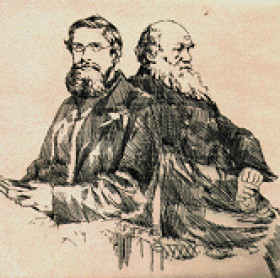Who Gets Credit, Who Takes Credit, for Changing the World?
Posted on 25. Jun, 2010 by Paul Sochaczewski in Alfred Russel Wallace and his assistant Ali, Articles

Did Darwin steal from Wallace? Attributing glory can be a tricky business
TERNATE, Indonesia
Who gets credit, and who takes credit, for changing the world?
July 1, 1858 was a modest news day in mid-19th century London. Thirty-nine year old Queen Victoria went horseback riding, Madame Tussaud announced a wax image of United States President James Buchanan, and the steamship North Star arrived from New York in eleven days and six hours, a new record.
But in the evening of that date, 150 years ago, an event occurred which, according to journalist Arnold Brackman, was “one of the great watersheds in the history of Western civilization.”
That cool evening members of the London’s august Linnean Society on Piccadilly heard two unpublished fragments about evolution written by the famous naturalist Charles Darwin, and a fully thought-out paper written by relative unknown Alfred Russel Wallace.
Neither Darwin nor Wallace was present. Darwin stayed at his home in England mourning the death of a son to scarlet fever; Wallace was in distant New Guinea chasing butterflies and beetles.
Wallace’s paper, formally titled On the Tendency of Varieties to Depart Indefinitely from the Original Type, and popularly dubbed The Ternate Letter after the eastern Indonesian town from where he mailed the study to Charles Darwin, was the first complete explanation of the process of natural selection, which introduced the concept that “the fittest would survive.”
To simplify a complex story, as a result of Wallace’s paper, Charles Darwin was pushed to complete Origin of Species, which was published in 1859. No doubt we will see a media blitz in 2009 when the world will celebrate the 150th anniversary of the publication of Darwin’s bestseller (which will also be the 200th anniversary of Darwin’s birth); perhaps similar to the visibility given in 2005 to the 100th anniversary of Einstein’s “Miracle Year”, during which Einstein published his special theory of relativity.
Alfred Russel Wallace, who was unaware that his paper had even been presented to the Linnean Society, continued collecting and writing about biogeography, island biology, changing sea levels and anthropology of the Malay archipelago, a region where he spent eight productive, but isolated years.
Darwin, a member of the British scientific elite, became a household name; Wallace, who left school at 14 and came from a modest family, ended up as a (rather important) footnote in history.
Historians and conspiracy theorists debate whether it was Wallace or Darwin who first conceived the concept of natural selection.
Some researchers argue that it was scientific coincidence — that both men had their eureka moments independently. Such an occurrence is not uncommon; it’s called a “multiple”: Newton and Leibniz both discovered calculus. Oxygen was discovered by Carl Wilhelm Scheel in 1773 and by Joseph Priestly in1774. Color photography was invented almost simultaneously by two Frenchmen. Four independent researchers discovered sunspots, all in 1611. Six men invented the thermometer and nine invented the telescope. And so on.
Nevertheless, a small but vocal group of Friends of Alfred suggest that Wallace came up with the key to evolution. And that Darwin stole it from him.
While the older and much better established Darwin had undoubtedly been thinking about evolution and collecting voluminous data, up to that moment he had not published a single word on the subject.
Wallace, on the other hand, had written several papers on evolution prior to the Ternate Paper, including the 1855 Sarawak Law, which stated the now obvious principle that “Every species has come into existence coincident both in space and time with a pre-existing closely allied species.”
Did Darwin plagiarize Wallace? The question can be addressed in both legal, and anecdotal terms.
British lawyer David Hallmark, who is a trustee of the Wallacea Foundation based in Indonesia, notes that as Darwin had not previously published and as the letter from Wallace stimulated publication it follows that Wallace was first and Darwin, whatever he wrote, was second. Also, Hallmark adds, when Darwin did publish he failed to attribute to Wallace the impact of the younger man’s Ternate letter on his own works, yet Darwin used the Wallace theory as his own. Therein lies the prima facie case of plagiarism.
There is circumstantial evidence that Darwin knew he had wronged Wallace and felt guilty about his actions.
Although we obviously don’t know everything that Darwin and his colleagues thought or said to each other, there is an illuminating paper trail of letters in which Darwin referred to the events as a “miserable affair” and his relationship with Wallace as “a delicate situation”. Darwin admitted, in a letter to the famous botanist Joseph Hooker, a friend who helped manipulate the Linnean Society presentation to Darwin’s benefit, that he had written “half a letter to Wallace to give up all priority to him”. Later, sounding a bit like Richard Nixon, Darwin wrote “I never did pick anyone’s pocket”. Darwin was clearly torn between doing the right thing and coming in second declaring “it seems hard on me that I thus should be compelled to lose my priority of many years standing but I cannot feel at all sure that this alters the justice of the case.”
So, on this anniversary I ponder ethics and history.
I do not know for certain whether Darwin plagiarized Wallace.
What I do know for certain is this.
First, the theory of evolution changed forever the way we view ourselves and our place in the universe. It was one of mankind’s great intellectual leaps forward.
Second, the July 1, 1858 gathering in London produced barely a ripple. Where were the fireworks, the polemics, the headlines? The president of the Linnean Society, Thomas Bell, noted in his 1858 annual report that the year “has not…been marked by any of those discoveries which at once revolutionise…the department of science in which they occur.”
